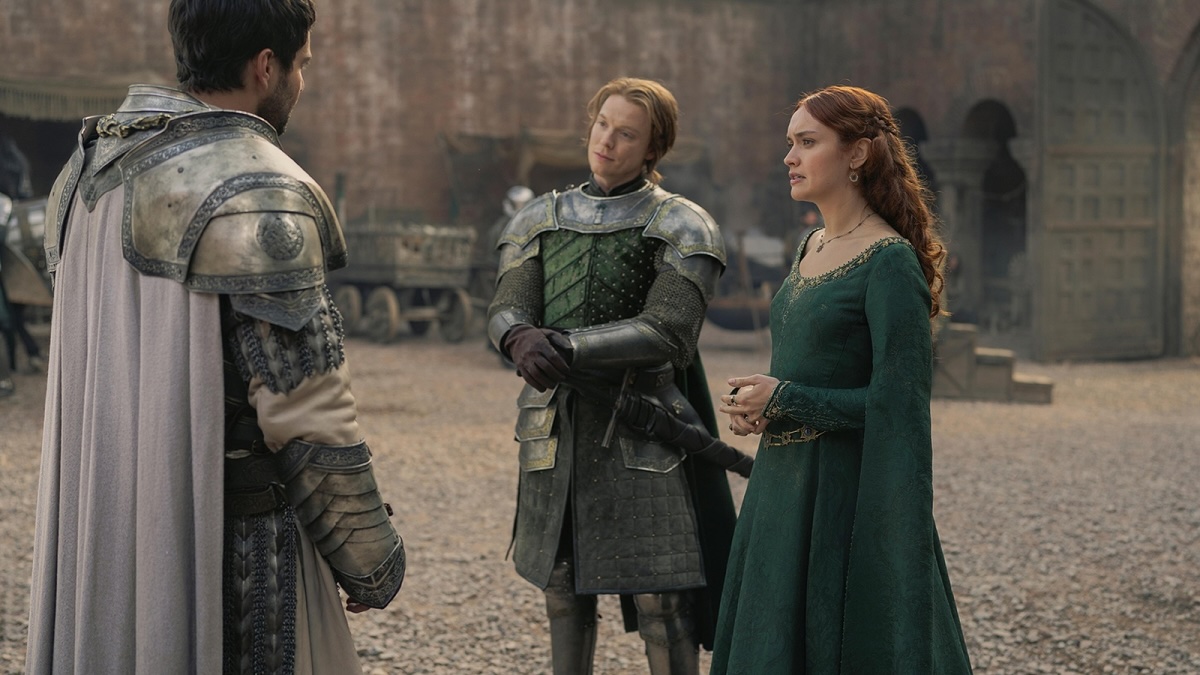Ser Criston Cole Weaponizing Courtly Love Is Exactly What ASOIAF is About
We love deconstructing tropes in this house!

Among everything George R.R. Martin has ever written within the universe of A Song of Ice and Fire, one thing that stands out is the consistent effort to deconstruct pretty much every classic fantasy trope.
As a long-time fantasy girlie, this is part of what drew me to ASOIAF in the first place and also really what is making me stay here and manifest every single day for a scrap of news about The Winds of Winter. So you can imagine my delight when I saw yet another clear-as-day example of a trope being completely demolished in the third episode of the second season of House of the Dragon, “The Burning Mill.”
Spoilers ahead!

It all starts with the confrontation between Queen Alicent and the newly-appointed Hand of the King, Ser Criston Cole, in the courtyard of the Red Keep as the Hand is getting ready to lead a relatively small party to take possession of Harrenhal. We have already seen the power dynamic between the two shift with Criston’s new status—what with him waiting for her in her chambers rather than her inviting him in and him silencing her during Small Council meetings—and things get even more tense when Alicent’s brother, Ser Gwayne Hightower, steps into the picture.
Ser Gwayne clearly loves his sister very much and is out to protect her—and he’s also biased against Dornishmen like pretty much everyone in the rest of the Seven Kingdoms is, which is why he has his fun taunting Criston and taking him down a notch. Alicent continues off of Gwayne’s jabs in what could also be seen as an attempt to gain some more control over Criston. And what does Criston do? He turns courtly love into a weapon. I love it. Love it! As a storytelling device, that is.

Courtly love, a literary device that was all the rage back in medieval Europe, was essentially the idea of a love that toed the line between erotic desire and spiritual attachment—a brave and fearless knight who loved a pure and fair lady, their love overwhelming but never to be acted upon except with heroic quests and longing glances. And since the world of ASOIAF is largely inspired by the Middle Ages in Europe, courtly love is alive and well in Westeros too.
We have actually already seen courtly love at play in House of the Dragon back in the very first episode of season one when Criston asks for Rhaenyra’s favor to wear in the joust. And young Alicent is endeared by that, maybe even a bit jealous, clearly desiring some version of courtly love for herself as well after having likely idolized it through songs and stories.
But now we see that courtly love is merely an illusion, and worse yet, yet another weapon with which men exert their power over women. Criston loudly asks for Alicent’s favor, and she can’t really deny him in the middle of the courtyard with a great number of members of the court watching. So she does give him her favor—with the most soulless face possible, oh Olivia Cooke the actress that you are—but we can clearly see that she is hating every second of it. She probably understands very well how this forceful request reduces her once more to a simple token, a gold star on his record as a man and as a knight.
The whole interaction is so uncomfortable that Gwayne notices all the way from the other side of the courtyard, throwing Criston what can only be described as a withering look. And even Criston appears slightly guilty of his actions as he mounts up on his horse.
It’s a brilliant reveal of the rot that lies under the polished surface of chivalry, of the way in which Westerosi society uses the idea of it and of romance as a way to objectify and control—something that Martin has already done with several characters from Game of Thrones, Sansa Stark first and foremost.
Have a tip we should know? [email protected]